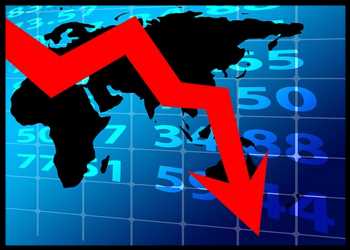Asian Markets Continue Plunge On Global Sell-off
Asian stock markets are trading mostly lower on Tuesday, extending the sell-off in the previous session, following the broadly negative cues from the global markets overnight, as rising worries about global economic slowdown, higher bond yields and looming aggressive interest rate hikes triggered heavy selling across the board. The Asian markets closed mostly sharply lower on Monday.
The US Federal Reserve is scheduled to announce its latest monetary policy decision on Wednesday, with the central bank expected to continuing raising interest rates in an effort to combat inflation. It is widely expected to raise rates by 50 basis points.
While the Fed’s rate hikes have been widely anticipated for months, traders seem increasingly concerned tighter monetary policy could trigger a period of stagflation or an outright recession.
News that China’s capital Beijing is facing an “explosive” COVID-19 outbreak connected to a bar stoked concerns of more crippling lockdowns in Beijing and Shanghai. A planned reopening of schools in the capital city if Shanghai was also delayed.
The Australian stock market is tumbling on Tuesday after the long weekend, extending the losses in the previous session, with the benchmark S&P/ASX 200 falling below the 6,600 level to a 16-month low, following the broadly negative cues from the global markets overnight, with a sell-off seen across all sectors amid the strong prospects the US Fed aggressively raising interest rates at its meeting on Wednesday to combat persistent inflation.
The benchmark S&P/ASX 200 Index is losing 330.80 points or 4.77 percent to 6,601.20, after hitting a low of 6,566.10 earlier. The broader All Ordinaries Index is down 349.80 points or 4.90 percent to 6,795.40. Australian stocks closed sharply lower on Friday prior to the holiday on Monday.
Among the major miners, Rio Tinto and Mineral Resources are slipping more than 5 percent each, while OZ Minerals is plunging almost 7 percent, Fortescue Metals is plummeting almost 8 percent and BHP Group is sliding almost 6 percent.
Oil stocks are lower, with Beach energy slipping 4.5 percent, while Santos, Woodside Energy and Origin Energy are declining more than 4 percent each.
Among tech stocks, Xero is sliding more than 6 percent, WiseTech Global is slipping almost 8 percent and Appen is declining almost 9 percent, while Afterpay owner Block and Zip are plummeting more than 17 percent each.
Gold miners are weak. Newcrest Mining is losing more than 2 percent, Resolute Mining is down almost 2 percent, Northern Star Resources is slipping more than 4 percent, Evolution Mining is declining more than 5 percent and Gold Road Resources is sliding almost 4 percent.
Among the big four banks, Commonwealth Bank and National Australia Bank are plunging more than 5 percent each, while Westpac and ANZ Banking are sliding more than 6 percent each.
In the currency market, the Aussie dollar is trading at $0.695 on Tuesday.
The Japanese stock market is sharply lower on Tuesday, extending the losses in the previous session, with the Nikkei 225 losing 600 points to fall below the 26,400 level, following the broadly negative cues from the global markets overnight, with weakness across most sectors amid the strong prospects the US Fed aggressively raising interest rates at its meeting on Wednesday to combat persistent inflation.The yen also fell to a 24-year low.
The benchmark Nikkei 225 Index closed the morning session at 26,446.82, down 540.62 points or 2.00 percent, after hitting a low of 26,357.90 earlier. Japanese shares ended sharply lower on Monday.
Market heavyweight SoftBank Group is losing more than 3 percent and Uniqlo operator Fast Retailing is down 1.5 percent. Among automakers, Honda is flat, while Toyota is losing almost 2 percent.
In the tech space, Advantest is losing almost 2 percent, Screen Holdings is declining more than 2 percent each and Tokyo Electron is down more than 3 percent. In the banking sector, Sumitomo Mitsui Financial is gaining almost 1 percent and Mizuho Financial is edging up 0.5 percent, while Mitsubishi UFJ Financial is flat.
The major exporters are higher, with Sony declining more than 3 percent and Panasonic edging down 0.3 percent, while Mitsubishi Electric and Canon are losing more than 1 percent each.
Among the other major losers, Nissan Chemical is plunging more than 7 percent, NEXON is sliding almost 6 percent and Daiichi Sankyo is declining more than 5 percent, while JGC Holdings and Isetan Mitsukoshi are slipping more than 4 percent each. ANA Holdings, Shiseido, Trend Micro, Sumitomo Realty & Development and Takashimaya are losing almost 4 percent each, while Kawasaki Heavy Industries, Rakuten Group, Kubota, Nikon and Mitsubishi Heavy Industries are down more than 3 percent each.
Conversely, Chiba Bank is losing almost 3 percent.
In the currency market, the U.S. dollar is trading in the lower 134 yen-range on Tuesday.
Elsewhere in Asia, New Zealand is plunging 3.0 percent, while Singapore and South Korea are down 1.1 and 1.3 percent, respectively. China, Hong Kong and Taiwan are lower by between 0.7 and 0.9 percent each. Indonesia and Malaysia are up 0.4 and 0.5 percent, respectively.
On Wall Street, stocks moved sharply lower during trading on Monday, extending the sell-off seen to close out the previous week. With the steep drop on the day, the major U.S. stock indexes ended the session at their lowest closing levels in over a year.
The Dow tumbled 876.05 points or 2.8 percent to 30,516.74, the Nasdaq plummeted 530.80 points or 4.7 percent to 10,809.23 and the S&P 500 plunged 151.23 points or 3.7 percent to 3,749.63.
The major European markets also showed notable moves to the downside. While the U.K.’s FTSE 100 Index dove by 1.5 percent, the German DAX Index and the French CAC 40 Index plunged 2.4 percent and 2.7 percent, respectively.
Crude oil futures rebounded from early losses and settled modestly higher on Monday as concerns about global supplies outweighed demand worries. West Texas Intermediate Crude oil futures for July ended higher by $0.26 or 0.2 percent at $120.93 a barrel.
Source: Read Full Article


